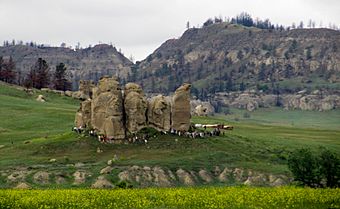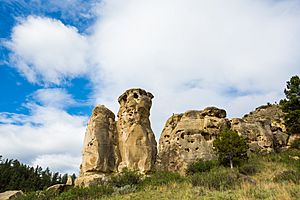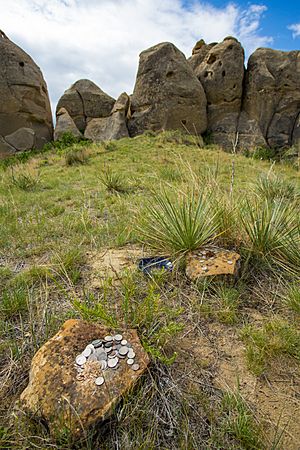Deer Medicine Rocks facts for kids
|
Deer Medicine Rocks
|
|
 |
|
| Location | 45°41’42”N 106°41’30”W |
|---|---|
| Nearest city | Lame Deer, Montana |
| NRHP reference No. | 12000244 |
Quick facts for kids Significant dates |
|
| Added to NRHP | March 12, 2012 |
| Designated NHL | March 12, 2012 |
Deer Medicine Rocks is a special sandstone rock formation in Montana, near Lame Deer. Its name comes from the Siouan people and means "Antler Rocks."
This place is very important because of its connection to the Great Sioux War of 1876-77. It's especially known for a powerful vision that the famous leader Sitting Bull had here in June 1876. During a special ceremony called a Sun Dance, he saw a vision that predicted a big victory for his people. This vision came true at the Battle of the Little Bighorn.
Deer Medicine Rocks is a National Historic Landmark. It's unique because it helps us understand the Battle of Little Bighorn from the point of view of the Native American people.
What are Deer Medicine Rocks?
Deer Medicine Rocks are found on the west side of Rosebud Creek. They are tall rock formations made of sandstone. Over a very long time, wind and water shaped these rocks, making them stand out from the surrounding hills. The rocks rise about 50 feet (15 meters) above the ground around them.
Ancient Art on the Rocks
At the bottom of these rocks, you can find many amazing rock art drawings. Experts believe some of these drawings are incredibly old, possibly from 1,000 to 4,000 years ago! Other drawings are more recent, made after Native Americans met Europeans. These newer drawings show things like cowboys, horses, and guns. The pictures on the rocks tell stories and show themes that are common in rock art found all over this region.
Sitting Bull's Vision
One particular drawing on the rocks is very special. It shows soldiers with long, "grasshopper-like" legs falling into a camp. The Lakota and Cheyenne people believe this drawing shows the vision that Sitting Bull had.
Sitting Bull had this powerful vision during a Sun Dance ceremony held at Deer Medicine Rocks. This ceremony took place when more than 3,000 Native Americans from different tribes were gathered there. In his vision, Sitting Bull saw soldiers falling into camp, which he understood to mean a great victory for his people. This vision came true shortly after, at the Battle of the Little Bighorn.
Deer Medicine Rocks is the first National Historic Landmark related to the Great Sioux War that is not a battlefield. It's important because it gives us a clear look at the war from the Native American perspective.



